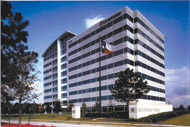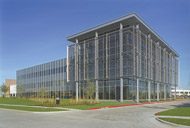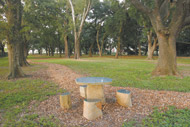| COVER STORY, JANUARY 2010
A NEW MODEL
Houston’s Wolff Companies takes business parks to a new level and sees success during tough times.
By Lindsey W. Marcec
Wolff Companies has operated in Houston since 1970, and — during those 40 years — the land development and investment firm has rarely ventured beyond the city limits for its business park projects. The company knows the city, and it knows it well. With that long-standing local knowledge, combined with sound development practices and a willingness to step outside the box, Wolff Companies has created a business park model that stands both the tests of time and economic hardship.
 |
Westway Park is one of Wolff Companies’ eight business parks in the Houston metro.
|
|
Wolff Companies has eight projects scattered throughout the Houston metropolitan area, six of which are completed while the other two are in various stages of development. The completed parks include Beltway, a 400-acre commercial business center in southwest Houston; Brookhollow, a 170-acre development in northwest Houston; First Crossing, a 65-acre, mixed-use commercial park in Sugar Land, Texas; Park 10 Regional Business Center in the West Houston Energy Corridor; Westway Park, a 150-acre office park in northwest Houston; and Windfern Forest, a residential/retail-focused development also in northwest Houston.
Currently in development are Interwood Business Park, a 440-acre, mixed-use development located at the entrance to George Bush Intercontinental Airport; and Ten Oaks, a medical-related, master-planned corporate business environment on Interstate 10 at Barker-Cypress Road. Texas Children’s Hospital and The Methodist Hospital are building two hospitals and medical office buildings — totaling more than 1.2 million square feet of improvements — in the first phase of the Ten Oaks project.
 |
Westway Park is Wolff Companies’ 150-acre office park in northwest Houston.
|
|
“We are getting a lot of interest from commercial uses that would be complementary or provide services to the hospitals,” says David W. Hightower, executive vice president and chief development officer for Wolff Companies.
However, the company won’t sell lots at the park to just anyone.
“We have a commitment to ourselves and to these hospitals that we will only do sales that are beneficial and add value to their investments,” he says.
It is this sort of business philosophy that has made Wolff Companies successful. The principals focus on quality and purpose, making sure that all aspects of their parks have a sense of cohesiveness — from their tenant roster to their property uses.
“The term ‘business park’ is seen to mean only industrial and flex space in many markets; we do something different,” Hightower says. “Our parks are master-planned to incorporate all commercial land uses in a complementary manner.”
 |
Wolff Companies set aside a 3-acre tract for a tree preserve in Westway Park. The preserve’s trees were planted at the turn of the century and include two of each native plant to the region.
|
|
Knowing how to incorporate these land uses comes easy, as Wolff Companies is solely in the land business — another distinctive aspect that sets the firm apart.
“The returns in land can be very good without the risk of actually building the buildings,” Hightower says. “This also gives us the opportunity to work with all the great development companies. If they’ve done business in Houston, they’ve worked with us.”
The land market is a very local business, according to Hightower. A company has to be constantly in the market to really know what’s going on; if they are from outside of a market, the ‘good deals’ they see were already passed over by the local companies, which means they really aren’t good deals after all. “There’s a lot to be said for that,” he says.
As a local, the firm is also able to pay close attention to the overall value of its parks from start to finish. On the planning and development side, Wolff Companies invests in attractive landscaping, pedestrian-friendly walkways, park space and other environmental aspects to ensure an enjoyable atmosphere for the office employees, hotel guests or apartment residents, depending on the mix of the particular park. Once all the sites are sold off and Wolff could feasibly step back out of the picture, the firm stays involved in the owners’ associations.
“Our Park 10 project is sold out, but we continue to be involved,” Hightower says. “We feel strongly as land developers, or you could call us master developers, that we have a moral obligation to the owners to see that the parks look nice and keep up their value.”
Another unique aspect of the firm’s business parks is that they are predominantly filled with user-owner occupied facilities, which Hightower says has made them more stable during the recent downturn.
“If you have a park that is full of spec buildings, you are more subject to the winds of change in the market,” Hightower says.
Even though his firm’s properties have enjoyed a good year, Hightower notes that, overall, Houston’s traditional business park activity has been very slow in 2009. The city and this particular market have been influenced by the national economy like everyone else. Some energy companies are expanding, while others are contracting. But, for his company, the long-term prospects are strong.
“We are very fiscally conservative, and because of our success, we are sitting on a sizable liquidity position,” Hightower says. “When we find the right deal, we’ll be able to move quickly. I’m looking to find the next Wolff Companies business park.”
©2010 France Publications, Inc. Duplication
or reproduction of this article not permitted without authorization
from France Publications, Inc. For information on reprints of
this article contact Barbara
Sherer at (630) 554-6054.
|
